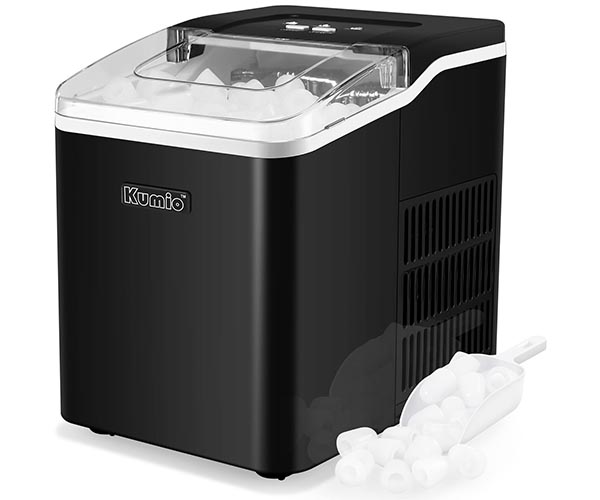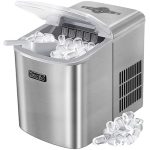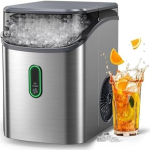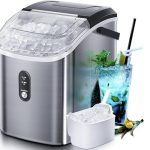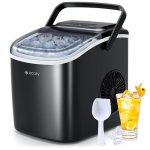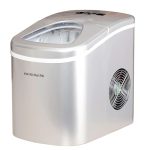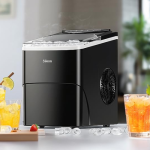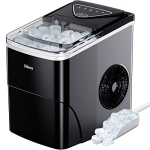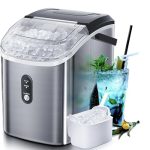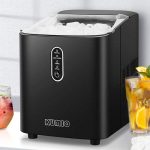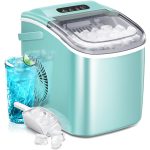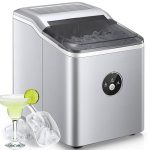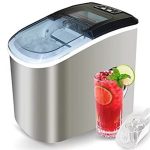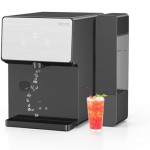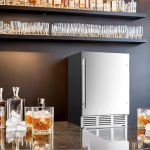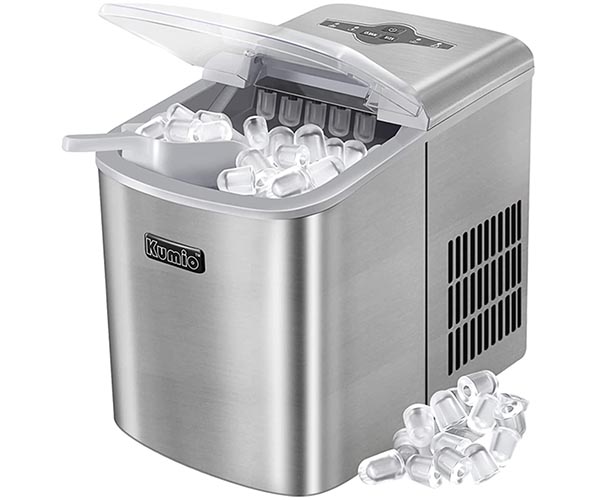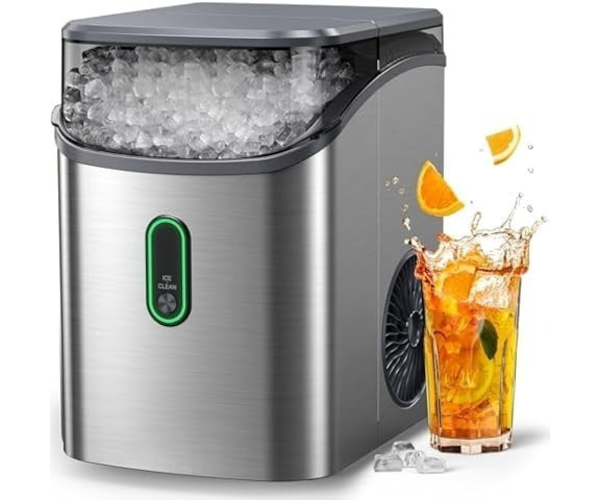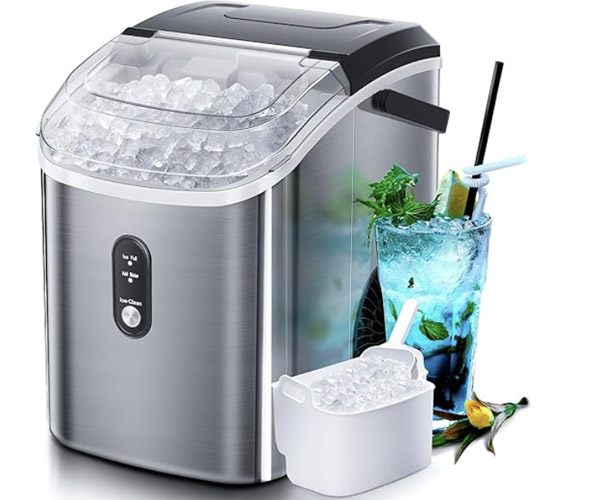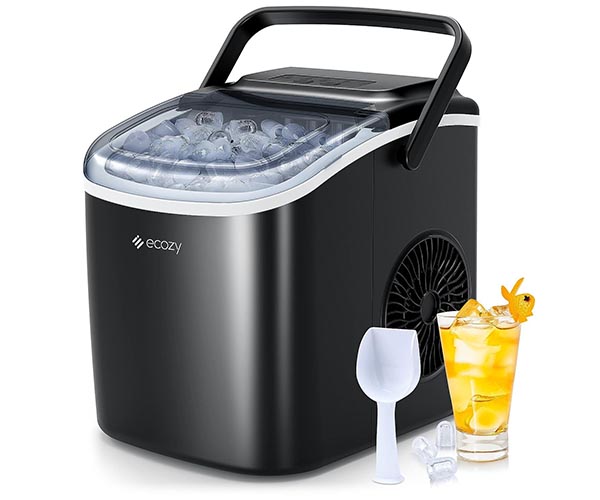Introduction
Countertop ice makers are a game-changer for those who love to entertain or simply enjoy the luxury of fresh ice on demand. Compact and efficient, these appliances offer several compelling benefits that make them a favored choice over traditional ice-making methods:
- Convenience: They eliminate the need for cumbersome ice trays or the frequent trips to the store for a bag of ice.
- Speed: Most countertop ice makers can produce ice in as little as 10 minutes, providing quick service when you need it most.
- Portability: Their compact size allows them to be used anywhere from kitchen counters to outdoor patios or even in RVs.
- Customization: Many models offer a selection of ice sizes and shapes, catering to varied preferences and needs, especially useful in preparing different types of beverages.
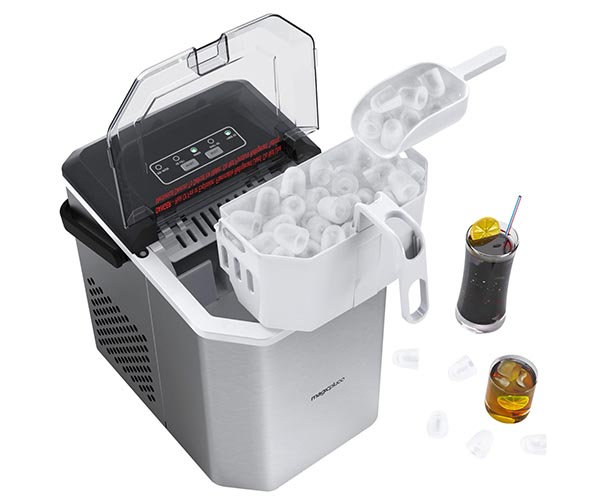
Given these advantages, one might wonder: Can regular cleaning influence the longevity and performance of these indispensable appliances? This article explores the significance of maintaining your ice maker and how frequent cleaning could be crucial in ensuring that it continues to function effectively over time. Join us as we dive into the best practices for cleaning your countertop ice maker and examine whether this routine maintenance can indeed extend the life of your device. https://amzn.to/3WoePQf
The Critical Importance of Cleanliness in Countertop Ice Makers
Maintaining cleanliness in countertop ice makers is not just about keeping your appliance looking good; it’s essential for ensuring health safety, optimal performance, and superior ice quality. Here’s why diligent cleaning is crucial:
Health Implications
- Prevention of Mold and Bacteria: Moist environments are breeding grounds for unwanted guests like mold and bacteria, which can contaminate ice and lead to health issues like food poisoning or respiratory infections. Regular cleaning eradicates these pathogens, keeping your ice safe for consumption.
- Safety of Ice Consumption: Since ice directly interacts with beverages and indirectly with our mouths, clean ice is critical. A well-maintained ice maker ensures that every cube you consume is free from harmful contaminants.
Impact on Machine Efficiency
- Prevent Buildup of Minerals and Scale: Hard water can deposit minerals and scale inside your machine, which can obstruct water flow and reduce efficiency. Regular descaling and cleaning maintain your machine’s functionality and prolong its lifespan.
- Maintain Functional Integrity: Keeping your ice maker clean prevents the accumulation of dust and debris that can interfere with its mechanical components, potentially leading to malfunctions and expensive repairs.
Ice Quality
- Taste and Odor: Nothing ruins a good drink like bad-tasting ice. A clean ice maker means your ice is always fresh, odor-free, and devoid of weird flavors that can come from mold or stagnant water.
- Appearance: Clean machines produce clear, impurity-free ice. Regular cleaning ensures that your ice is not only functional but also aesthetically pleasing, making every beverage visually appealing.
Understanding and implementing regular cleaning routines for your countertop ice maker is more than a chore; it’s a key step towards ensuring the health of anyone who enjoys a cold drink from your kitchen. Not only does it keep the ice tasting great, but it also extends the life of your machine, ensuring it operates at peak efficiency for years to come.
Optimal Cleaning Frequency for Countertop Ice Makers
Determining how often to clean your countertop ice maker is crucial for maintaining both the quality of your ice and the longevity of the appliance. Manufacturers typically provide guidelines, but the frequency can also depend on usage and water quality. Here’s a breakdown to help you keep your ice maker in top shape:
Manufacturer Guidelines
- Regular Cleaning Schedule: Most manufacturers recommend cleaning the ice maker every three to six months as a baseline. However, this can vary depending on the model and brand. Always check your user manual for specific recommendations.
- Deep Cleaning: For ice makers in constant use, such as in a commercial setting or during hot seasons when usage increases, a more frequent deep cleaning might be necessary.
Usage-Based Cleaning
- High Usage: In situations where your ice maker is used daily, consider cleaning it monthly to prevent issues related to overuse.
- Low Usage: If you only use your ice maker occasionally, cleaning it every six months may suffice. However, it’s crucial to run a cleaning cycle before and after extended periods of non-use to prevent any buildup or stale water from sitting.
Signs That Indicate a Cleaning Is Needed
- Odd Tasting Ice: If the ice begins to taste off or causes beverages to have an unusual flavor, it’s a clear indicator that your ice maker needs cleaning.
- Visible Residue or Scale Buildup: Look out for white, chalky residue inside the ice maker or on the ice itself, which indicates mineral deposits from hard water.
- Smelly Ice or Machine: Any strange smells emanating from the ice or the machine itself can signify mold or bacterial growth, which requires immediate cleaning.
- Slow Ice Production: If you notice that ice production is slower than usual, it might be due to scale buildup affecting the machine’s efficiency.
- Cloudy Ice: Clear ice is a sign of a clean and well-functioning ice maker. If the ice becomes cloudy, it could mean there are impurities in the machine.
Regular maintenance of your countertop ice maker isn’t just about adhering to a schedule; it’s about being responsive to the signs that the appliance itself gives off. By keeping an eye on these indicators and cleaning accordingly, you can ensure that your ice maker remains a reliable and hygienic source of refreshment. https://amzn.to/3WoePQf
Comprehensive Step-by-Step Guide to Cleaning Your Ice Maker
Keeping your countertop ice maker clean not only ensures the production of high-quality ice but also extends the appliance’s lifespan. Follow this detailed cleaning guide to keep your machine running efficiently:
Preparation
- Unplug the Machine: Safety first—ensure the ice maker is unplugged before you begin cleaning.
- Remove All Ice and Water: Empty any remaining ice and drain the water reservoir to prepare the machine for a thorough cleaning.
Cleaning Solutions
- Approved Cleaners: Use cleaners that are recommended by the manufacturer. Typically, mild dish soap and warm water are safe, but for deeper cleans, diluted white vinegar or a commercial descaling solution can be used to tackle mineral buildup.
- Natural Options: For a more natural approach, mix a solution of equal parts water and distilled white vinegar. This mixture is effective at removing odors and buildup without the use of harsh chemicals.
Cleaning Procedure
- Interior Cleaning:
- Wipe Down the Interior Surfaces: Using a soft cloth or sponge, wipe down the interior surfaces with your chosen cleaning solution. Be sure to reach into crevices where ice and water residue may accumulate.
- Sanitize: After cleaning with soap or vinegar, use a sanitizing solution to wipe down the interior again. You can use a bleach solution (1 tablespoon of bleach per gallon of water) to ensure all bacteria are killed. Ensure the space is well-ventilated when using bleach.
- Exterior Cleaning:
- Wipe the Exterior: Clean the outside of the ice maker with a damp cloth dipped in soapy water, paying extra attention to the control panel and any buttons.
Rinsing and Drying
- Rinse Thoroughly: After cleaning and sanitizing, rinse all surfaces with clean water to remove any traces of cleaning solutions. This step is crucial to prevent any chemical taste in the ice.
- Dry Completely: Wipe down the machine with a clean, dry cloth. Allow the ice maker to air dry by leaving the lid or door open for at least an hour before plugging it back in. This helps to prevent any mold or mildew from forming due to residual moisture.
By following these steps, you ensure that your countertop ice maker is not only clean but also maintained in a condition that promotes both efficiency and longevity. Regular cleaning, as detailed above, is essential for the health of anyone enjoying the ice from your machine and for the functionality of the appliance itself.
Proactive Maintenance Tips for Countertop Ice Makers
Proper maintenance of your countertop ice maker can drastically reduce the need for frequent deep cleans and extend the appliance’s lifespan. Here are some essential tips to keep your ice maker in optimal condition:
Regular Emptying and Drying
- Daily Emptying: Make it a routine to empty the ice bin daily. This prevents ice from melting and refreezing, which can create buildup and make the cleaning process more challenging.
- Thorough Drying: After emptying, wipe down the interior with a dry cloth to remove any residual moisture. This step is crucial to prevent mold and mildew growth, common issues in moist environments.
Storing in a Cool, Dry Place
- Ideal Storage Conditions: Store your ice maker in a cool and dry area when not in use. Extreme temperatures and direct sunlight can degrade the components over time, while humidity can promote the growth of mold and mildew.
- Protective Cover: If the ice maker will not be used for an extended period, consider covering it with a breathable material to protect it from dust and other environmental contaminants.
Regular Checks for Signs of Wear or Malfunction
- Visual Inspections: Regularly inspect your ice maker for any signs of wear or damage, such as cracks, loose components, or water leaks. Early detection can prevent more significant issues down the line.
- Functional Testing: Periodically test the ice maker’s functions—even during periods of infrequent use—to ensure everything is operating as it should. Look out for changes in ice quality, strange noises, or inefficient ice production, which can indicate potential problems.
- Professional Servicing: If you notice any persistent issues or if the ice maker is performing below expectations, consider having it serviced by a professional. Regular professional maintenance can help address any mechanical problems before they escalate and ensure your machine remains in good working condition.
By adhering to these preventative maintenance tips, you can significantly reduce the frequency of deep cleans and maintain the performance and longevity of your countertop ice maker. Regular care not only ensures the production of high-quality ice but also safeguards your investment in the appliance.
Real-Life Success Stories: The Impact of Regular Cleaning on Ice Maker Longevity
The benefits of regular maintenance of countertop ice makers aren’t just theoretical. Many users have witnessed firsthand how consistent cleaning routines can significantly enhance the performance and extend the lifespan of their machines. Here are some compelling testimonials and case studies that illustrate these benefits:
Testimonial from Sarah, Home Cook and Entertainer:
- Background: Sarah has used her countertop ice maker for over five years in her busy household, hosting frequent family gatherings.
- Routine: Adhering to a monthly cleaning schedule using a vinegar solution followed by a thorough rinse.
- Outcome: Sarah reports that her ice maker still produces ice as quickly as when it was new, with no mechanical issues or degradation in ice quality.
- Quote: “Regular cleaning might seem like a hassle, but for me, it’s been the key to keeping my ice maker running like a dream. It’s as essential as any other kitchen maintenance!”
Case Study: Jake’s Outdoor Bar Ice Maker:
- Background: Jake runs a popular outdoor bar where the ice maker is crucial for operations, especially during the summer.
- Routine: Implements a bi-weekly deep cleaning regimen due to the high usage and outdoor environmental factors.
- Observations: Despite the challenging environment and heavy use, the ice maker has outlasted previous models by several years.
- Feedback: “Keeping our ice maker clean has not only ensured it works efficiently during the busiest times but has also drastically cut down on repair costs. It’s a no-brainer for any business!”
Testimonial from Linda, Health Enthusiast:
- Background: Linda uses her ice maker daily to prepare healthy smoothies and iced beverages.
- Routine: Cleans her ice maker with a bleach solution every three months and inspects it for any signs of mold or scale buildup.
- Benefits: Linda has noticed that her ice tastes better and is free of any off-smells or flavors, which is crucial for her health-focused lifestyle.
- Quote: “I never skip on cleaning my ice maker. It’s crucial for ensuring the ice is pure and safe, complementing my healthy diet.”
Case Study: The High-Volume Coffee Shop:
- Background: A busy urban coffee shop that uses its ice maker continuously throughout the day.
- Routine: Monthly professional maintenance and weekly staff-led cleanings.
- Results: The machine has maintained optimal performance even under high strain, with minimal downtime or repairs needed over its operational life.
- Manager’s Comment: “Investing time in regular cleanings has paid off by keeping our ice maker in excellent condition, ensuring we can always meet customer demand without interruption.”
These stories highlight not just the necessity but the tangible benefits of maintaining a strict cleaning regimen for countertop ice makers. Whether for personal use or in a commercial setting, regular maintenance ensures these machines can reliably produce high-quality ice while avoiding common mechanical issues.
FAQs about Can frequent cleaning extend the life of your countertop ice maker?
- How often should I clean my countertop ice maker?
- It is generally recommended to clean your countertop ice maker every 3-6 months to ensure optimal performance and maintain hygiene. If you use hard water, which can lead to quicker mineral buildup, consider cleaning it more frequently, perhaps every 6-8 weeks.
- Can I use bleach to clean my countertop ice maker?
- Using bleach is not advisable as it may damage the internal components of the ice maker. Stick to mild dish soap, vinegar, or a manufacturer-recommended commercial ice maker cleaner.
- Is it okay to clean my ice maker in a dishwasher?
- No, you should not clean your ice maker in a dishwasher. The components of ice makers are generally not dishwasher-safe, and the harsh conditions inside a dishwasher could damage the appliance.
- How do I remove mineral buildup from my ice maker?
- To remove mineral buildup, use a vinegar and water mixture. Let it sit in the machine for a while to dissolve the minerals, then scrub gently if needed and rinse thoroughly.
- Should I leave the ice maker empty after cleaning?
- After cleaning and drying your ice maker, it is recommended to run a couple of cycles with clean water to flush out any residual cleaning solution. This ensures that no taste or residue affects your ice.
- Why is regular cleaning important for an ice maker?
- Regular cleaning of your ice maker prevents the accumulation of mold, bacteria, and mineral deposits. This not only ensures the production of clean and safe ice but also helps maintain the efficiency and extend the lifespan of your appliance.
Conclusion: Maximizing the Potential of Your Countertop Ice Maker
Regularly cleaning your countertop ice maker is more than just a chore; it’s a crucial practice that enhances the appliance’s performance and extends its lifespan. Let’s recap the significant benefits of maintaining a regular cleaning schedule and why it’s vital to incorporate these practices into your routine:
- Optimal Performance: A clean ice maker operates at peak efficiency, producing ice more quickly and reliably.
- Enhanced Longevity: Frequent cleaning prevents the buildup of minerals and impurities that can wear down the machine’s components over time.
- Health and Safety: Regular maintenance ensures that the ice produced is free from contaminants like bacteria and mold, safeguarding your and your family’s health.
- Improved Ice Quality: Clean machines produce clearer, better-tasting ice, free from any unpleasant odors or flavors.
By embracing these cleaning practices, you ensure that your ice maker remains a dependable and efficient part of your daily life. Not only will it continue to deliver excellent performance, but it will also serve you for many years to come without the need for frequent repairs or replacements. So, take the time to care for your appliance, and enjoy the endless supply of fresh, clean ice it provides. Make regular cleaning a part of your routine and see the difference it makes. Your countertop ice maker is an investment in your comfort and convenience—treat it well, and it will continue to perform at its best.
Call to Action: Share Your Insights and Spread the Knowledge
Now that you’ve learned the ins and outs of keeping your countertop ice maker in top condition, we’d love to hear from you! Your experiences and tips are invaluable, and sharing them can help others optimize their own appliance use:
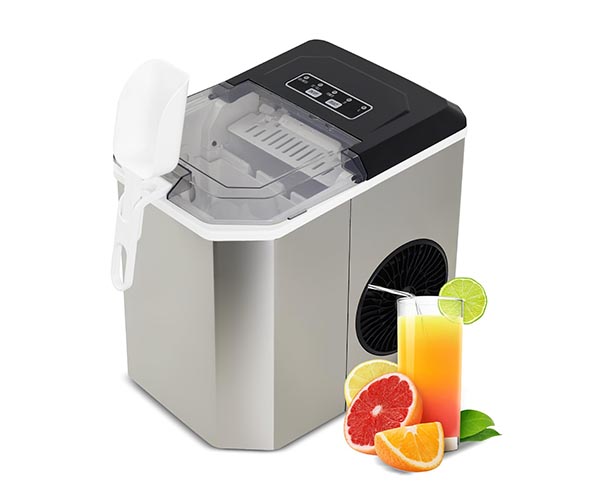
- Share Your Stories: Have you noticed a difference in your ice maker’s performance following regular cleanings? Maybe you’ve discovered a handy trick that makes maintenance even easier. Drop a comment below and let the community benefit from your insights.
- Spread the Word: If you found this guide helpful, please share it with friends, family, or anyone who might benefit from these tips. The more people who know how to care for their ice makers effectively, the better the ice, the drinks, and the gatherings will be.
By participating and promoting these practices, you contribute to a community focused on efficiency and health. Your input not only supports others in maintaining their appliances but also enhances the overall experience of enjoying fresh, clean ice every day. So, don’t hesitate—comment and share today, and help us build a community of informed and proactive ice maker users. https://amzn.to/3WoePQf
References
- GE Profile Opal Nugget Ice Maker Product Page
- NewAir Countertop Ice Maker Product Page
- Igloo ICEB26HNBK Portable Electric Countertop Ice Maker Product Page
- Scotsman SCN60PA-1SS
- EUHOMY Nugget Ice Maker Countertop
- Silonn Ice Maker Countertop
Additional Resources
- [How often should you clean your countertop ice maker?]
- [What happens if you don’t clean your countertop ice maker regularly?]
- [How does a countertop ice maker work?]
- [How to install a countertop ice maker?]
- [How often to descale a countertop ice maker?]
- [Buying Guide: Countertop Ice Makers with Water Line Connection]
- [Kitchen Upgrade Ideas: Countertop Ice Makers with Water Line]
- [Which countertop ice maker with freezer is best?]

